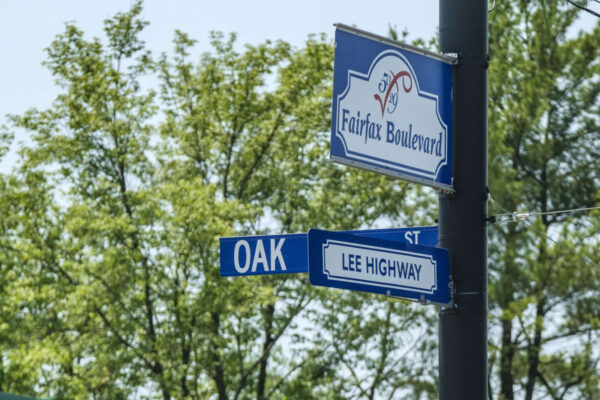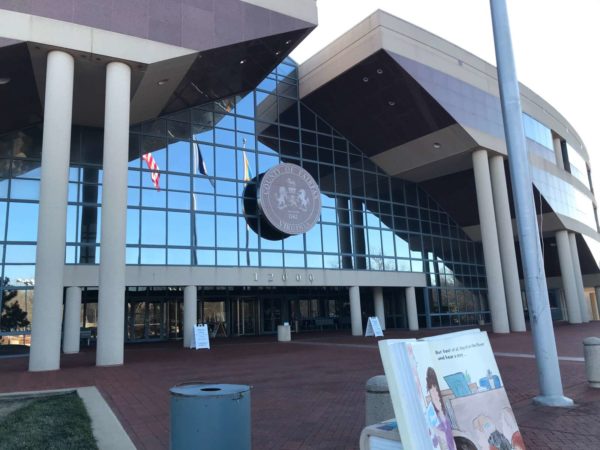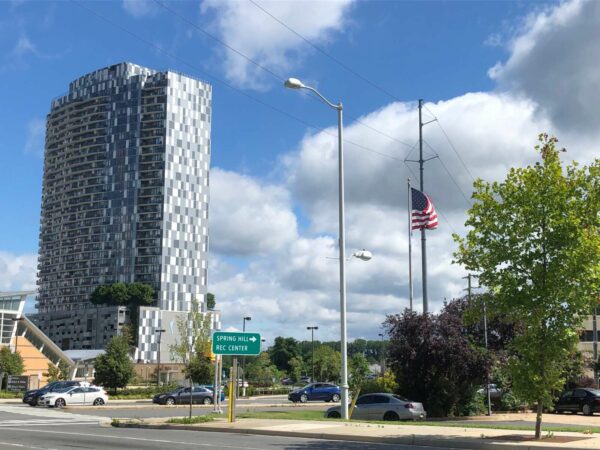
Abandoned shopping carts can create problems and even be left in streams, but a new state law seems to provide little help, Fairfax County supervisors say.
During a land use policy committee meeting yesterday (Tuesday), the Board of Supervisors reexamined a Virginia law intended to discourage people from taking shopping carts away from businesses, worrying that introducing a local ordinance might just add an exhaustive and ineffective process.
“What we’re asking of our investigators is extraordinarily time-consuming and fruitless,” Braddock District Supervisor James Walkinshaw said of the draft abandoned shopping cart ordinance.
A leading concern is that adding an ordinance may take up time and put an unnecessary administrative burden on county staff, who could, for example, document the same incident twice since the state law dictates that a cart’s owner get a 15-day notification period before it can be removed.
Currently, if a cart is blocking a road or a group is cleaning up a stream, there is no restriction on removing it.
The Virginia General Assembly passed a law in 2020 to allow counties to pass legislation to:
- Fine people with a civil penalty up to $500 for removing shopping carts from stores’ premises and parking lots
- Make stores liable for returning or disposing of abandoned carts, including paying up to $300 per cart that the county removes
The land use policy committee discussed the issue in December, though staff advised against adopting an ordinance and board members were skeptical. During the meeting, Chairman Jeff McKay voiced opposition to fining people trying to get groceries home.
The draft ordinance that the county presented on Tuesday only referenced fines for businesses — not individuals.
Even before the 2020 state law, the Commonwealth made removing shopping carts from store premises and parking lots a misdemeanor, with the potential for a fine up to $500.
“My problem with this is…it provides absolutely no incentive for people to stop stealing carts,” said Springfield District Supervisor Pat Herrity, who also wondered if certain areas or customers might be disproportionately affected. “This is kind of outside the businesses’ control.”
Photo via David Clarke/Unsplash
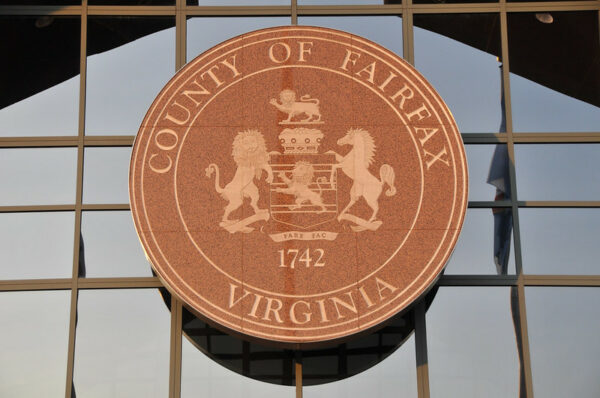
Fairfax County could send over $24.4 million in federal money to small businesses recovering from the COVID-19 pandemic through its PIVOT grant program.
The money, which doesn’t have to be repaid, is intended to help economic recovery efforts. After an application period ran from June 23 to July 9, county officials gave updates on the program to the Fairfax County Board of Supervisors during an economic initiatives committee meeting this morning (Tuesday), stressing the timing and scope of the support.
“Our retail services and amusements businesses really did need this funding,” said Theresa Benincasa, economic mobility manager with the county’s Department of Economic Initiatives. “They stepped up and requested it in large numbers.”
Nearly 1,600 applicants for Fairfax County’s small business PIVOT grant program are eligible to get the money based on an initial eligibility check, while 921 applicants are ineligible, county staff reported.
During the meeting, Board of Supervisors Chairman Jeff McKay asked if the county had flexibility on an eligibility requirement that a business have a commercial storefront. He said two businesses approached him about the issue, one of which was a catering business tied to a closed office building.
Benincasa said officials could work with him on that issue.
Most of the applicants that were ineligible didn’t meet the threshold for economic injury. Over 300 didn’t have a commercial storefront, and nearly 200 secured a Small Business Administration Restaurant Revitalization Fund grant, which provided $283,000 on average, according to the county.
Recipients had to have at least a 15% loss in annual revenue. Eligible applicants averaged a 46% reduction in revenue and 25% reduction in employees, according to county data.
Benincasa noted that applications are still moving through a three-step process to obtain the money. The first step involved using a web portal to determine initial eligibility, and the remaining steps could last from August to November.
The grants are being funded with $25 million that the county received from the American Rescue Plan Act. If demand surpassed that threshold, the county had prepared to prioritize funding to hotels and then create a lottery system for other applicants, but because it didn’t, that randomization element will be scrapped, the county said Tuesday.
The breakdown of awards is projected to be the following:
- $14.1 million to 1,178 applicants with an average of four employees in the areas of retail, services, and amusements
- $5.4 million to 309 applicants with an average of eight employees in the food service sector
- Nearly $4.5 million to 61 applicants with an average of 25 employees in the lodging sector
- $415,000 to 49 applicants with an average of four employees in the areas of arts organizations, museums, and historical sites.
The awards range from $1,500 to $18,000 per business, which all had to have 500 employees or fewer.
Hotels could receive $400 per room if they had 10 rooms or more. In January, the American Hotel and Lodging Association released a report on the “sharp and sustained” drop in travel due to COVID-19 in 2020 and projected that the travel industry won’t fully recover until 2024.
Benincasa said that most of the hotels in the county are getting PIVOT money, but that didn’t include all of them, possibly because of the 500-employee cap.
“The need is immediate,” said Dranesville District Supervisor John Foust, who chairs the economic initiatives committee, noting the county’s work isn’t finished in helping small businesses.
Photo via Machvee/Flickr

Fairfax County took a first step yesterday toward potentially taxing plastic bags used by grocery stores and other retailers.
The Board of Supervisors voted 9-1 yesterday (Tuesday) to direct county staff to draft an plastic bag tax ordinance, but even supporters of the measure allowed that there remains some uncertainty around how exactly the tax would be implemented if approved.
“Let’s definitely try this, but we may end up back in the General Assembly in the foreseeable future to try to get clarification,” Hunter Mill District Supervisor Walter Alcorn said, noting that the county is subject to the Dillon rule. “…This is probably a prime example of when we probably need a little more flexibility, but I’m all for it.”
The Virginia General Assembly passed legislation during its 2020 session giving localities the authority to impose a five-cent tax on disposable plastic bags, starting on Jan. 1, 2021.
Roanoke became the first jurisdiction to take advantage of the new law when it adopted an ordinance in May that’s set to take effect on Jan. 1, 2022.
Under House Bill 534, which was identical to Senate Bill 11, cities and counties can tax each disposable plastic bag provided to customers by grocery stores, convenience stores, and drugstores. The tax would not apply to plastic bags designed to be reused, garbage bags, bags used to hold or package food to avoid damage or contamination, and ones used to carry prescription drugs or dry cleaning.
The legislation allows retailers to retain two cents from the imposed tax on each bag until Jan. 1, 2023, when the amount that goes to retailers drops to one cent.
That “dealer discount” provision is intended to help offset additional expenses retailers might incur from adjusting their operations, but it also puts added pressure on localities to adopt an ordinance as soon as possible, according to Board of Supervisors Chairman Jeff McKay.
“We want to start the process of the ordinance review, looking at the language, the public input, because the clock literally is ticking,” McKay said.
Complicating matters is the fact that the Virginia Department of Taxation has not yet released guidelines clarifying what a plastic bag tax ordinance should look like, leaving questions around the definition of a grocery or convenience store, how the tax will be enforced, and other issues, County Executive Bryan Hill told the board in a Nov. 30 memorandum.
Braddock District Supervisor James Walkinshaw, who introduced the board matter on Tuesday, said the draft guidance that county staff has seen and provided input on through the Northern Virginia Regional Commission will clear up many of those questions.
He hopes the guidelines will be finalized soon so county staff can incorporate them into the ordinance that they have now been directed to draft and present to the board in September.
Springfield District Supervisor Pat Herrity, the lone Republican on the board, opposed the board matter, taking issue with the timing of the proposal. Read More
(Updated at 9:10 a.m. on 7/15/2021) Fairfax County is convening a “Confederate Names Task Force” specifically charged with making a recommendation about renaming the county’s portions of Lee Highway and Lee-Jackson Memorial Highway.
The Board of Supervisors approved the appointment of the 30-member task force on Tuesday (July 13).
The task force’s mission is to review the names of Lee Highway (Route 29) and Lee-Jackson Memorial Highway (Route 50) to determine if the roads should be renamed and, if so, what the names should be. A county-appointed facilitator will also work with the task force.
The roadways currently bear the monikers of Confederate generals Robert E. Lee and Thomas “Stonewall” Jackson.
This is a direct result of the work done by the county’s history commission to identify and inventory every place in the county named after a Confederate. The 539-page report noted that there were about 157 streets, parks, monuments, subdivisions, and public places in the county bearing names with ties to the Confederacy.
The most prominent were Lee Highway, about 14 miles of which runs through the county around Merrifield, Fairfax, and Centreville, and Lee-Jackson Memorial Highway. About 8.5 miles of that roadway runs through the county, including Chantilly and near Fair Oaks Mall.
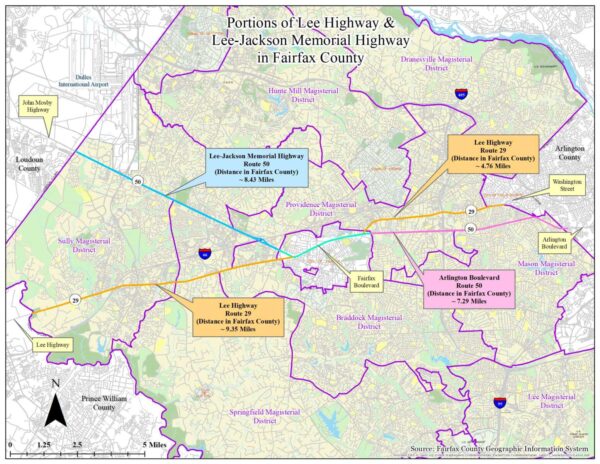
“In Fairfax County, our diversity is our greatest strength and it’s important that we honor and celebrate that diversity,” Board of Supervisors Chairman Jeff McKay said in the press release. “We cannot ignore what the Lee and Lee Jackson Memorial Highway names represent in our community and especially to our African American neighbors. The Confederate Names Task Force, which includes a diverse group, will examine and make recommendations on how both roadways can better reflect our values as we chart a positive path together for the future.”
The task force will meet monthly, starting later this month or early August, according to the agenda for the board meeting. The meetings will be open to the public, and the task force will seek input from the public prior to making a decision.
The group is expected to provide a recommendation to the county board by “the end of calendar year 2021.”
The task force is chaired by Sully District Planning Commissioner Evelyn Spain, who will be joined by 29 other members, including historians, civic organization leaders, homeowners’ association members, residents, professors, and faith leaders.
Spain says reevaluating the use of Confederate street and place names is necessary if Fairfax County wants to be inclusive and respectful of its increasingly diverse population.
“Naming highways after Robert E. Lee and Stonewall Jackson celebrates men who fought a war against the United States to perpetuate slavery,” Spain said in a statement. “One Fairfax requires us to look at these issues through an equity lens to understand how these names have negatively impacted our community and people of color as well as how Confederate names adversely impacts them today…I’m honored to be a part of the Confederate Names Task Force as we work toward building a more inclusive and equitable Fairfax County.”
If the task force recommends changing the names of the roads, the county will have to undergo a somewhat complicated process to actually make it happen — much like it was when Arlington renamed its portion of Route 29 and Alexandria renamed Route 1, which had been named after Confederate President Jefferson Davis.
If changes are recommended, the task force would need to provide two to five alternate names for each road. Then, the county board and task force will hold at least one public hearing to allow for comment about the potential change.
After the public hearings, the board will then vote on whether to take the task force’s recommendation. A timeline laid out back in May projected that could happen in early 2022.
If the board votes to change the highway names, it would then submit a resolution to the Commonwealth Transportation Board requesting the changes while also committing to paying for the signage.
If that’s approved by the Commonwealth, the board has to pass a budget item for the cost of the signs, and an interdepartmental working group would set up a timeline for the actual switching out of signs and, finally, officially changing the roads’ names.
The working group will also coordinate with other jurisdictions on their name changes.
Fairfax County will conduct a “comprehensive review” of the county’s response to the COVID-19 pandemic.
At today’s (July 13) Board of Supervisors meeting, Chairman Jeff McKay proposed as a board matter to have County Executive Bryan Hill review how county agencies responded to the challenges of the pandemic, how operations were affected, and how operational changes impacted the community.
The review will take place in two parts. The board directed staff to deliver a report with conclusions, recommendations, and areas of improvement in February 2022, and a follow-up is anticipated since the pandemic is still ongoing.
The motion passed unanimously.
“We did an amazing job [dealing with the pandemic],” McKay said, but he acknowledged that a review is needed since “there’s much to be learned about the county’s response and how we can improve upon that for the future.”
McKay also noted that a review is already essentially under way, but this formalizes the process and sets a deadline on it.
Hunter Mill District Supervisor Walter Alcorn agreed with the effort and asked the county executive not to pull any punches.
“I ask the county executive not to shy away from identifying challenges…[particularly] those in the labor market that were attributed to the pandemic and what happened after,” Alcorn said.
As noted in McKay’s comments, more than 75% of Fairfax Health District residents 18 years or older have received at least one vaccine shot. That’s above both national and state averages.
However, the county continues to face some challenges in convincing those who are still hesitant to get vaccinated.
When it comes to addressing COVID-19’s economic impact, the county has provided assistance with rent, food, and other basic needs to more than 10,000 households and helped get permanent housing for 400 individuals who were experiencing homelessness when the pandemic began, according to McKay’s board matter.
The county has also distributed more than $52 million in small business relief funding through the RISE program and is offering $25 million in their PIVOT program.
While half of the RISE grants went to minority-owned businesses, those businesses still suffered “acutely” during the pandemic. What’s more, the Northern Virginia Black Chamber of Commerce recently said it felt neglected in the development of some of the county’s grant programs.
McKay said that getting a comprehensive report on Fairfax County’s COVID-19 response will help the county government “ensure we maintain the level of service and functionality our community expects” in any future large-scale crisis or emergency.
MCA Supports Proposal to Replace Office Building — “The McLean Citizens Association’s board of directors on July 7 passed a resolution generally supportive of a proposed townhouse development at 7700 Leesburg Pike, but sought changes to bolster pedestrian safety and discourage cut-through traffic.” [Sun Gazette]
Lack of Transparency Frustrates Justice Park Advocates — Documents obtained by the community group Justice for Justice Park, which opposes a proposal to convert part of the Falls Church park into a parking lot, show that county park and school officials had been negotiating a land transfer for two years without telling the public. The group argues a master plan amendment should be required before any moves are made. [The Annandale Blog]
New Jersey Driver Wanted for Assault on Police Officer — According to the Fairfax County Police Department’s weekly report, a police officer was treated at a hospital for minor injuries after attempting to arrest a man who was driving a vehicle without the owner’s permission. The incident occurred in the 2000 block of Peach Orchard Drive in Tysons on July 3, and the man has not been located yet. [FCPD]
Vienna Named Bicycle-Friendly Community — The Town of Vienna has been recognized by the League of American Bicyclists as a bronze-level Bicycle-Friendly Community, an award given to “communities that demonstrate a strong commitment to bicycling by creating transportation and recreational resources that benefit residents and improve the quality of life.” [Town of Vienna]
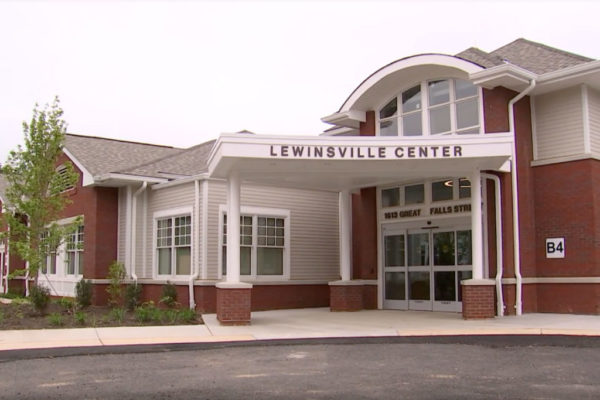
A majority of Fairfax County’s senior centers have reopened, allowing residents to come in to workout, play games, and use the computers.
Eight of the county’s 14 senior centers opened their doors on June 29 for the first time since March 2020 for “self-directed activities,” meaning those that are not led by staff like card games, ping-pong, billiards, working out in the fitness room, and using the computer labs.
The centers that are now open are:
- Herndon Senior Center (873 Grace Street, Herndon)
- Kingstowne Center for Active Adults (6488 Landsdowne Center, Alexandria)
- Lewinsville Senior Center (1613 Great Falls Street, McLean)
- Lincolnia Senior Center (4710 North Chambliss Street, Alexandria)
- Little River Glen Senior Center (4001 Barker Court, Fairfax)
- Lorton Senior Center (7722 Gunston Plaza, Lorton)
- Sully Senior Center (14426 Albemarle Point Place, Chantilly)
- Wakefield Senior Center at Audrey Moore RECenter (8100 Braddock Road, Annandale)
Residents can use any of the centers, even if it’s not their usual one. Lunch and bus service can also be provided by calling the individual center.
However, the centers currently have limited hours, operating from 9 a.m. to 4 p.m., Tuesday through Friday.
Residents also have to sign a liability waiver prior to visiting. Masks are still required for those who are not fully vaccinated, but are optional for those who are.
The remaining six centers will reopen on Sept. 7, with the exception of Hollin Hall in Alexandria, which is undergoing renovations.
At that time, all of the centers will revert to “full capacity,” including bringing back instructor and staff-led activities, a spokesperson for the county’s Neighborhood & Community Services says.
The senior centers cater to residents 50 years and older.
Three quarters of the Fairfax Health District’s population has received at least one dose of the vaccine, and those rates are even higher for those residents over the age of 55. About 93% of residents 65 to 84 years old have received at least one dose.
Vaccination efforts have allowed more and more county services and facilities to open back up.
“The county’s senior centers are a lifeline for our older residents, providing them with opportunities to exercise, play games, take classes and most importantly socialize with each other,” Hunter Mill District Supervisor Walter Alcorn said by email. “The pandemic was especially isolating for older adults, taking a toll on both mental and physical health. It is a very welcome step forward to open up several of the senior centers now and have the full reopening in September.”
Virtual activities, classes, and programs will continue to be offered throughout the summer for those who prefer to remain at home or want to participate in a staff-led activity. These include Tai Chi, crossword puzzling, and crafts.
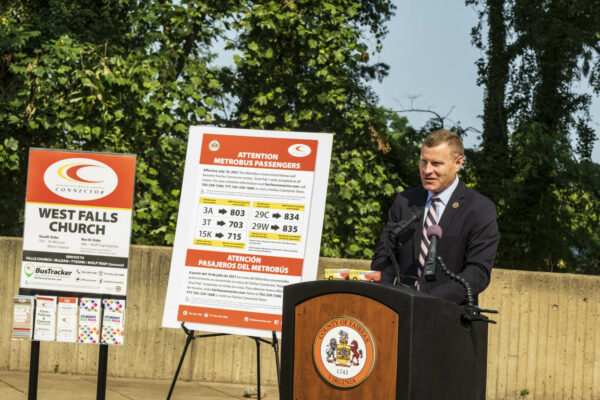
(Updated at 10:05 a.m.) Bus routes taken offline during the pandemic are making a comeback.
Fairfax County officials gathered outside the West Falls Church Metro station yesterday (Tuesday) to herald the upcoming changes involving the Fairfax Connector, which will take over several Metrobus routes starting Saturday (July 10) and also adjust service on several key routes.
“As we come out of the pandemic, it’s never been more important to have robust bus service…to get people back on transit to remind them how convenient it is, how practical it is and how easy it is to use,” Fairfax County Board of Supervisors Chairman Jeff McKay said.
McKay noted that county officials chose the Metro station as the location for their press conference formally announcing the changes, because the new bus routes will help bring transit riders there. The five new Fairfax Connector routes are projected to serve around 69,000 residents.
Another Fairfax Connector service change also starting Saturday involves discontinuing route 422 (Boone Boulevard to Howard Avenue) due to low ridership and duplicate service provided by routes 401, 402, 462, and 467, the county said.
Approved by the county board in March, the changes will restore four existing routes that were run by Metrobus but had ceased operating due to the COVID-19 pandemic. The county bus system will also take over a fifth route.
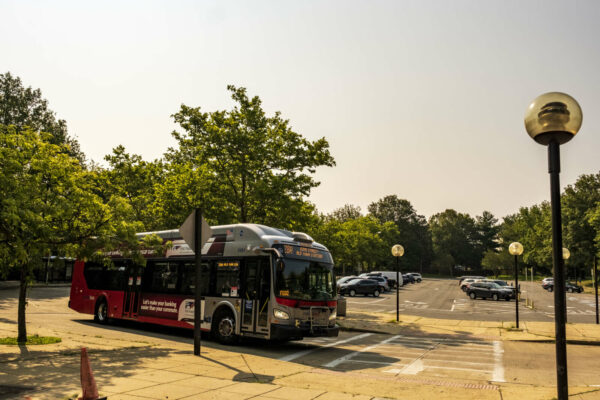
The county detailed the changes as follows:
- 703: Pimmit Hills (former 3T route) will provide weekday and Saturday service, linking Pimmit Hills and Tysons to the McLean and West Falls Church Metrorail stations. The service operates every 30 minutes during weekday rush hours and every hour during weekday non-rush hours and Saturdays.
- 715: East Falls Church – Langley (former 15K route) will have weekday rush hour service every 30 minutes to further link McLean, Salona Village, and Chesterbrook Gardens to the East Falls Church Metro station.
- 803: Annandale Road (former 3A route) will deliver weekday and Saturday service, linking Lake Barcroft, Annandale, and North Springfield to the East Falls Church Metro station; it operates every 30 minutes during weekday rush hours, every 40 to 60 minutes during weekday non-rush hours, and every 45 minutes on weekends.
- 834: Annandale-Pentagon (former 29C route) will extend to Northern Virginia Community College’s Annandale Campus Route and offer weekday rush hour service every 30 minutes linking Northern Virginia Community College, Annandale and Lincolnia to the Pentagon Metro station; express service is $4.25.
- 835: Annandale-Pentagon (former 29W route) will extend to part of Olley Lane and Braeburn Drive and have weekday rush hour service every 30 minutes linking the Northern Virginia Community College and Willow Woods communities to the Pentagon Metro station; express service is $4.25.
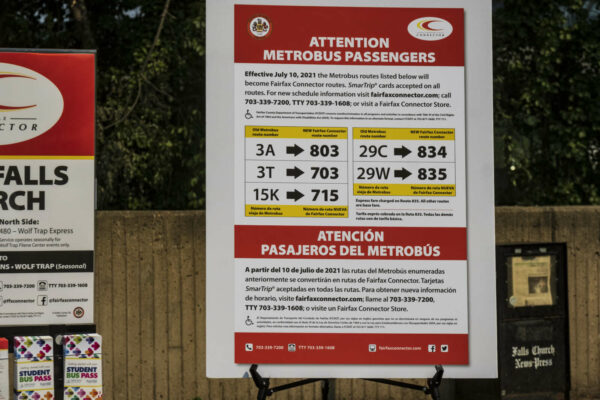
Bus fees are $2 ($1 for seniors) and have unlimited transfers within two hours of boarding with a SmarTrip card. More information is available at fairfaxconnector.com, which also provides text and email alerts as well as customer service contact information.
“We are pleased to restore and enhance these services,” McKay said.
Other service changes involve routes 171 (Richmond Highway), 462 (Dunn Loring to Tysons), and 630 (Stringfellow Road — Centreville).
Dranesville District Supervisor John Foust called this an exciting time for Fairfax Connector specifically and transit in general, pointing to next year’s anticipated, long-delayed launch of the second phase of Metro’s Silver Line.
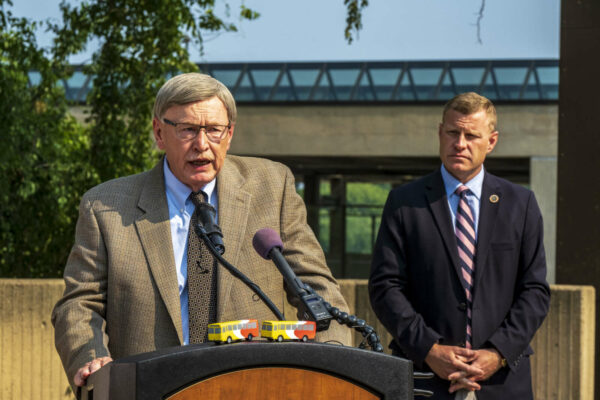
The moves also come as the county looks to move away from diesel buses by 2035, which the board noted last week is ahead of the Washington Metropolitan Area Transit Authority’s timeline to have electric buses by 2045.

County Leaders Frustrated by State Funding for Prosecutors — Fairfax County leaders say Virginia’s current formula to determine funding for Commonwealth’s Attorney offices undermines criminal justice reform efforts by rewarding localities that seek incarceration over diversion. A 15-month, state-commissioned study of the issue is set to launch this month. [The Washington Post]
Progress on Unemployment Rate Stalls — “Like much of Northern Virginia, Fairfax County’s jobless rate has improved substantially from the depths of the COVID crisis a year before, but now seems struck in neutral as it attempts to return to pre-pandemic lows…Fairfax’s jobless rate of 3.7 percent in May was up a tick from 3.6 a month before, according to figures reported June 30 by the Virginia Employment Commission.” [Sun Gazette/Inside NoVA]
Tysons-Based Engineering Contractor Acquired — “Newport News-based Fortune 500 military shipbuilder Huntington Ingalls Industries will acquire McLean-based defense contractor Alion Science and Technology Corp. from Veritas Capital in a $1.65 billion, all-cash deal, HII announced in a news release Tuesday. The deal is expected to close by the end of this year.” [Virginia Business]
County to Hold Virtual Meeting on Strategic Plan — “Join us July 21 for a virtual community conversation to share your thoughts on the Fairfax Countywide Strategic Plan as we move forward to shape the future of Fairfax County together. Register online.” [Fairfax County Government/Twitter]

The Fourth of July is coming up this weekend, and with Monday (July 5) as a designated federal holiday, many public facilities and services will be shaking up their schedules.
The Fairfax County Health Department announced today (Friday) that all of its COVID-19 vaccination clinics will be closed on Independence Day, but walk-in services will be available at the Fairfax County Government Center and the former Safeway at Mount Vernon Square in Alexandria on Saturday.
A vaccine site at Springfield Town Center will also be open for walk-ins on Monday.
Here are some other closures that county residents should keep in mind this holiday weekend:
Fairfax County Government
- County government offices will be closed on July 5.
Fairfax County Courts
- The Fairfax Circuit, General District, and Juvenile and Domestic Relations District courts will be closed all day on July 5.
Town of Vienna
- Town offices will be closed all day.
- The Vienna Community Center will be closed.
- The holiday will not affect waste collection. Residents scheduled for pick-up on Mondays can place their waste by the curb as normal, but no brush, bulk, or yard waste will be collected.
City of Falls Church
- All city offices and services, including City Hall, the Mary Riley Styles Public Library, and the Falls Church Community Center, will be closed.
Public Schools
- Fairfax County Public Schools will be closed in observance of Independence Day.
County Libraries, Recreation Centers, Parks
- All Fairfax County library branches will be closed.
- All Fairfax County RECenters will operate at their regular hours.
- Colvin Run Mill, Sully Historic Site, Hidden Oaks, Hidden Pond, E.C. Lawrence, and Huntley Meadows nature centers will be closed.
- The farm at Frying Pan Park and the indoor arena will be open, but the visitor center will be closed.
- The McLean Community Center will be closed on Sunday and Monday.
Public Transit
- Fairfax Connector buses will operate on a Saturday service schedule on Monday. Check the Connector website for details on specific routes.
- WMATA Metrorail service will operate from 7 a.m. to 11 p.m. on Saturday and 8 a.m. to 11 p.m. on Sunday. Details on routes and closed stations can be found on the Metro website.
- WMATA Metrobus will operate on a Saturday service schedule on Monday.
County Trash and Recycling
- There will be no change in the county’s trash and recycling collection.
- The recycling and disposal centers at the I-66 Transfer Station and I-95 Landfill Complex will be closed.


